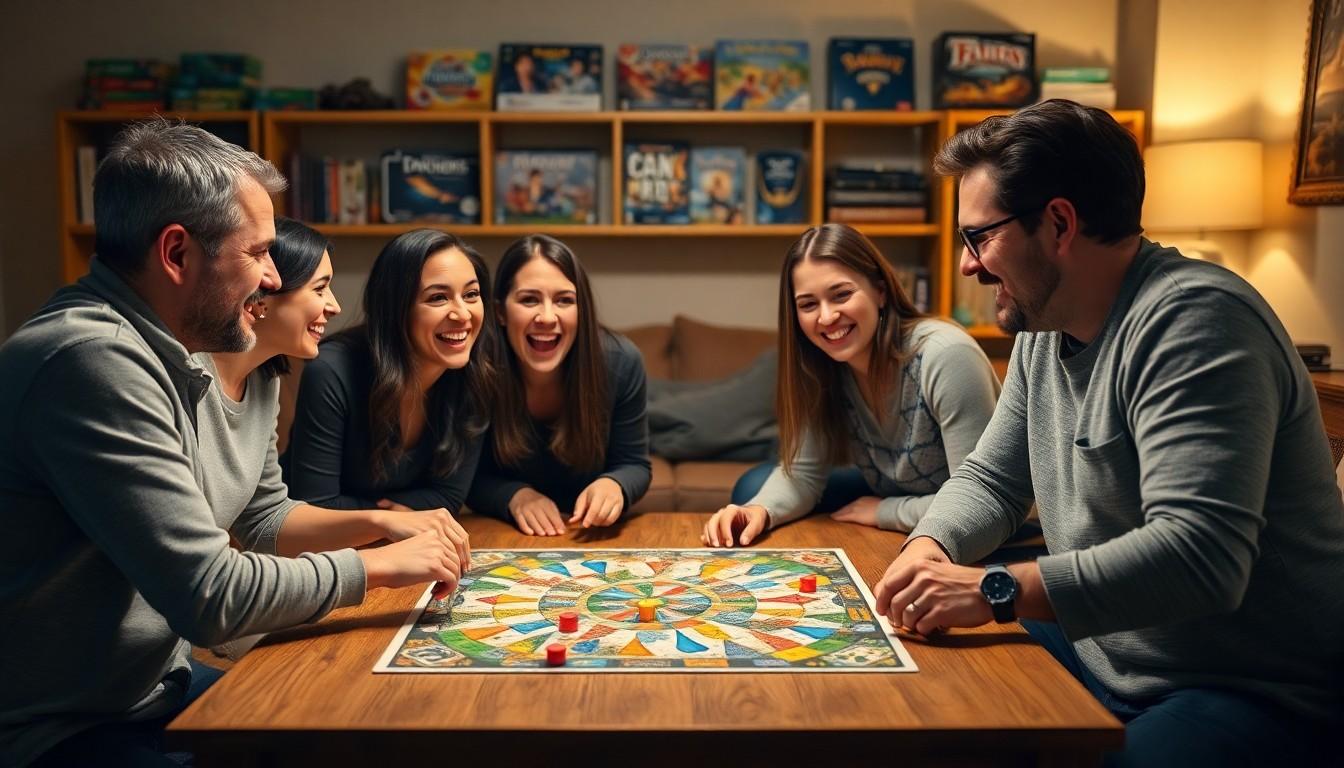In a world where Netflix binges and scrolling through social media reign supreme, competitive board games are making a glorious comeback. Imagine gathering friends around a table, laughter echoing, and the thrill of friendly rivalry sparking excitement. These games aren’t just for kids; they’re the ultimate test of strategy, wit, and perhaps a little luck. To spread the word about game nights or tournaments, printable flyers can be a great way to invite friends and build excitement. Who knew that a simple cardboard box could unleash such fierce competition and unforgettable memories?
Competitive Board Games
Competitive board games offer an engaging alternative to digital entertainment. These games foster face-to-face interaction, allowing friends and families to unite for challenges that spark laughter and collaboration. Popular titles include classics like Monopoly, Settlers of Catan, and Ticket to Ride. Each game embodies unique strategies, appealing to diverse player preferences.
Players often experience heightened excitement during matches, as competition ignites camaraderie and rivalry. The variety of game mechanics contributes significantly to the allure of this genre. For instance, resource management games require players to think critically and plan ahead. In contrast, party games focus on social interaction and quick thinking.
Many competitive board games cater to a wide audience. Some titles are designed for children, while others challenge adults with intricate rules and strategies. Game nights become unforgettable experiences as players share their victories, defeats, and the skills they’ve acquired over time.
Statistics reveal an increasing number of board game cafes and clubs. These venues provide an inviting atmosphere for enthusiasts and newcomers alike, facilitating the exploration of new titles. Furthermore, community events create opportunities for players to engage with others who share a passion for strategic gameplay.
Competitive board games present an enjoyable method for building connections and sharpening cognitive skills. The thrill of strategizing, competing, and celebrating victories defines the heart of this vibrant gaming culture.
Importance Of Competitive Board Games

Competitive board games play a vital role in fostering connections among players. Engaging in these games encourages face-to-face interaction, which fosters communication and strengthens friendships. Players share laughter and friendly banter, enhancing their ability to socialize. Family dynamics improve as they collaborate or compete against one another.
Social Interaction
Social interaction thrives during competitive board game sessions. Players engage in lively discussions, fostering an environment of camaraderie and connection. Competitive scenarios allow participants to express themselves while learning about their friends’ strategies and thought processes. Observing varying approaches to the same game cultivates understanding among players. Board games also provide a platform for people of all ages to bond, establishing connections that may not surface in digital platforms.
Skill Development
Skill development occurs naturally in competitive board games. Players enhance their strategic thinking by analyzing opponents’ moves and adjusting their tactics accordingly. Decision-making skills improve as players weigh options and consider potential outcomes. Additionally, cognitive skills such as problem-solving gain strength through navigating complex game mechanics. Players also build patience and resilience, especially when facing challenges or setbacks during gameplay. These skills have lasting impacts, extending beyond the table into everyday life situations.
Types Of Competitive Board Games
Competitive board games come in various formats, each offering unique gameplay experiences that cater to different player preferences.
Strategy Games
Strategy games emphasize planning and decision-making skills. Titles like Chess and Risk challenge players to think several moves ahead; positioning and resource management play pivotal roles. Players engage in tactical battles, often requiring deep analysis of opponents’ moves. These games attract those who enjoy intense mental challenges and long-term strategic planning. Each match presents an opportunity to develop skills in critical thinking and foresight, appealing to players who thrive on competition.
Party Games
Party games focus on social interaction and fun, making them ideal for groups. Games such as Codenames and Telestrations encourage creativity and laughter. Turn-based mechanics often lead to quick rounds, allowing for multiple games in one sitting. Players benefit from engaging in light-hearted competition while building camaraderie. These games create memorable moments, cultivating an environment filled with enjoyment and stimulation. Unlike strategy games, party games prioritize entertainment and ease of play, allowing everyone to join in on the fun.
Popular Competitive Board Games
Competitive board games provide enjoyable experiences, catering to various tastes. They stimulate strategic thinking and social interaction.
Classic Titles
Classic titles dominate the gaming landscape, having established their reputation over time. Monopoly challenges players with property trading and strategic management, appealing to those who enjoy long-term planning. Chess promotes deep strategic thinking and tactical maneuvers, inviting players to engage in a battle of wits on the checkered board. Scrabble encourages word creation, testing players’ vocabulary and creativity. These games foster competition and connection, making them timeless choices for family and friends.
Modern Favorites
Modern favorites introduce innovative mechanics and fresh themes, further captivating players. Catan emphasizes resource management and trade, encouraging players to build settlements while negotiating with opponents. Ticket to Ride combines strategy and planning in a race to complete train routes, engaging game night participants with its accessible gameplay. Codenames adds a twist to word association, prompting social interaction as teammates decipher clues. Each game enriches the competitive board game landscape, appealing to both new players and seasoned enthusiasts.
Tips For Choosing The Right Competitive Board Game
Selecting a competitive board game requires consideration of various factors. Analyze the player count first to ensure the game fits the group size. Many games cater to four to six players, while some can accommodate larger numbers.
Evaluate the age range of participants to match their preferences and comprehension levels. Some games suit children and families, while others challenge adults with complex strategies.
Consider game mechanics next. Players may prefer strategy-based games, social party games, or resource management games. Each genre offers distinct experiences that cater to different player tastes and abilities.
Examine the duration of gameplay. Some games take only 30 minutes, while others can last several hours. Choose a game that aligns with the time available for a game night.
Read reviews and ratings from other players. Insights from the gaming community can highlight aspects of gameplay that may appeal to specific interests.
Explore the theme of the game. Players often gravitate toward particular themes like fantasy, history, or exploration. Thematic engagement adds excitement to the competitive experience.
Try out games at board game cafes or clubs. These venues allow players to test a variety of titles before making a purchase, ensuring an informed choice.
Prioritize high replayability. Games that can be played multiple times without becoming stale enhance the overall enjoyment and encourage repeated gatherings among friends.
Check for expansions or customizations. Some games offer additional content that enriches gameplay. Players can explore these options to keep the experience fresh and engaging.
Special Niche in Social Entertainment
Competitive board games have carved out a special niche in social entertainment. They provide a unique blend of strategy and interaction that digital options often lack. As players gather around the table they share laughter and forge connections that last beyond the game night.
With a diverse array of titles available there’s something for everyone. Whether it’s the deep strategy of Chess or the light-hearted fun of Codenames players can find a game that suits their style. Moreover the rise of board game cafes and community events has made it easier than ever for enthusiasts to discover and enjoy new experiences.
These games not only entertain but also foster important skills and strengthen relationships. Embracing the world of competitive board games can lead to unforgettable memories and a deeper appreciation for the art of play.




